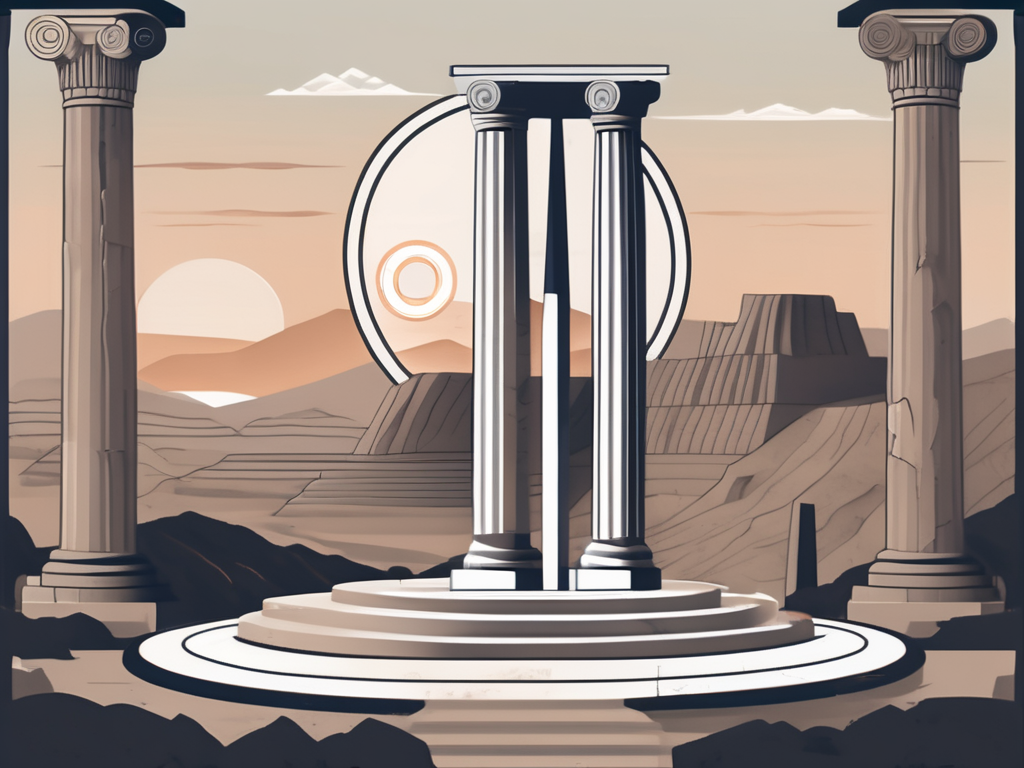Stoicism and Taoism are two philosophical schools of thought that have captivated the minds of scholars and individuals seeking guidance on how to navigate the complexities of life. Although they originate from different cultures and time periods, Stoicism and Taoism share some common ground while diverging in several crucial aspects. Understanding the basics of these philosophies can shed light on their profound impact on individuals and society at large.
Understanding the Basics of Stoicism
Origins and Historical Context of Stoicism
Stoicism, a philosophical school of thought, emerged during the Hellenistic period in Ancient Greece, gaining prominence through the teachings of philosophers such as Zeno of Citium and Epictetus. It found favor among the Romans, particularly esteemed intellectuals and statesmen like Seneca the Younger and Marcus Aurelius. Stoicism offered a framework for individuals to find tranquility and virtue amidst the uncertainties of the world.
Stoicism originated in Athens around 300 BCE, during a time of great political and social upheaval. It was a response to the chaos and instability that followed the death of Alexander the Great, as well as the decline of the city-state system. The Stoics sought to provide a philosophy that would help individuals navigate the challenges of life and find inner peace.
Key Principles and Beliefs of Stoicism
Central to Stoic philosophy is the idea of living in accordance with nature, accepting the inevitable ebb and flow of life’s circumstances. Stoics believed that wise individuals can cultivate their virtues, such as wisdom, courage, and justice, to live a fulfilled life. They emphasized the importance of focusing on the things within one’s control and developing resilience in the face of adversity.
Stoicism teaches that the key to happiness lies in our ability to distinguish between what is within our control and what is not. By focusing our energy and attention on the things we can change, such as our thoughts, actions, and attitudes, we can find peace and contentment. Stoics also believed in the power of reason and rationality, seeing them as essential tools for navigating the complexities of life.
Prominent Stoic Philosophers and Their Contributions
The Stoic philosophy has been enriched by the profound insights of influential thinkers. Zeno of Citium, the founder of Stoicism, established its fundamental doctrines. He believed that the path to happiness lies in living in accordance with nature and developing virtues.
Epictetus, a former slave turned philosopher, introduced the concept of the dichotomy of control, distinguishing between what is within our power and what is not. He emphasized the importance of accepting the things we cannot change and focusing on our own thoughts and actions.
Marcus Aurelius, the Roman Emperor, captured the essence of Stoicism in his renowned work “Meditations.” In this collection of personal reflections, he explored the power of self-reflection and acceptance. Marcus Aurelius believed that by examining our own thoughts and emotions, we can gain a deeper understanding of ourselves and the world around us.
These prominent Stoic philosophers, along with many others, have contributed to the development and evolution of Stoicism, leaving behind a rich legacy of wisdom and guidance for those seeking to live a more virtuous and fulfilling life.
Delving into the Taoism Philosophy
Taoism: An Overview and Its Historical Roots
Taoism, originating in ancient China, represents a way of life centered around the concept of “Dao” or “The Way.” Rooted in the teachings of Laozi, a sage and philosopher, Taoism embraces the idea of harmonizing with the natural order of the universe. It encourages individuals to embrace simplicity and balance, seeking harmony within themselves and the world around them.
Fundamental Concepts and Teachings of Taoism
Taoism lays emphasis on the notion of Wu Wei, often translated as “non-action” or “effortless action.” It promotes the idea of going with the flow of life, yielding to circumstances and avoiding unnecessary struggle. Taoists encourage individuals to connect with their instincts, to be in tune with the rhythms of nature.
In addition to Wu Wei, another important concept in Taoism is Yin and Yang. This concept represents the duality and interconnectedness of all things. Yin represents the feminine, passive, and receptive aspects, while Yang represents the masculine, active, and assertive aspects. Taoists believe that achieving balance between Yin and Yang is essential for living a harmonious and fulfilling life.
Furthermore, Taoism emphasizes the cultivation of inner virtue and the practice of compassion. Taoists strive to cultivate qualities such as humility, kindness, and patience. They believe that by embodying these virtues, individuals can contribute to the well-being of society and create a more harmonious world.
Influential Taoist Thinkers and Their Impact
Many noteworthy thinkers have contributed to the development of Taoist philosophy. Laozi, the revered figure who authored the classic text “Tao Te Ching,” shaped the core principles of Taoism. His teachings have had a profound influence on Chinese culture and spirituality.
Zhuangzi, another influential Taoist thinker, further expanded upon the ideas presented by Laozi. He emphasized the importance of embracing spontaneity and embracing the interconnectedness of all things. Zhuangzi’s writings, filled with poetic and allegorical stories, offer profound insights into the nature of reality and the human experience.
Other notable Taoist thinkers include Liezi, who explored the themes of self-cultivation and inner transformation, and Wang Bi, who provided commentaries on the Taoist classics. These thinkers, each contributing their unique perspectives, have enriched the tapestry of Taoist philosophy and continue to inspire seekers of wisdom and truth.
Comparative Analysis: Stoicism and Taoism
Similarities Between Stoicism and Taoism
Despite their geographical and cultural differences, Stoicism and Taoism display striking similarities in various aspects. Both philosophies emphasize the necessity of living virtuous lives, acknowledging the impermanence of the physical world and the importance of mindfulness. They advocate for self-reflection, prudence, and the cultivation of inner tranquility.
Stoicism, originating in ancient Greece, promotes the idea that individuals should focus on what they can control and accept what they cannot. This aligns with the Taoist belief in the importance of embracing the natural flow of life, known as the Tao. Both philosophies encourage individuals to let go of attachments and desires that lead to suffering, and instead, find contentment in the present moment.
Furthermore, Stoicism and Taoism share a common emphasis on the power of the mind. Stoics believe that reason is the key to achieving virtue and living a good life. Similarly, Taoists emphasize the importance of cultivating a clear and tranquil mind to align with the natural order of the universe.
Contrasting Views: Where Stoicism and Taoism Diverge
While Stoicism focuses on the power of reason and self-discipline, Taoism celebrates the spontaneity and flow of life. Stoics prioritize personal virtue and the well-being of the human community, while Taoists emphasize the harmonious coexistence with the natural world and the ungraspable Tao. The two philosophies offer distinct approaches to facing life’s challenges and finding meaning.
Stoicism encourages individuals to detach themselves from emotions and desires, viewing them as obstacles to tranquility. By practicing self-discipline and rationality, Stoics aim to achieve inner peace and live in accordance with nature. On the other hand, Taoism embraces the idea of wu-wei, which translates to “non-action” or “effortless action.” Taoists believe that by letting go of excessive control and allowing things to unfold naturally, individuals can find harmony and balance in life.
Moreover, Stoicism places a strong emphasis on the human community and the pursuit of justice. Stoics believe that individuals have a moral duty to contribute to the well-being of society and to act in accordance with reason. In contrast, Taoism emphasizes the interconnectedness of all things and encourages individuals to live in harmony with nature. Taoists seek to align themselves with the rhythms of the natural world, finding wisdom and guidance in observing the cycles of the seasons and the flow of energy.
In conclusion, while Stoicism and Taoism share common ground in their teachings on virtue, impermanence, and mindfulness, they diverge in their approaches to life and finding meaning. Stoicism emphasizes reason, self-discipline, and the well-being of the human community, while Taoism celebrates spontaneity, harmony with nature, and the ungraspable Tao. Both philosophies offer valuable insights into navigating life’s challenges and cultivating inner peace.
Practical Applications of Stoicism and Taoism
Stoicism in Everyday Life
Stoic principles can profoundly impact our daily lives by offering practical guidance on dealing with the inevitability of challenges. Stoics advocate for maintaining an equanimous mindset, approaching difficulties as opportunities for personal growth. By focusing on what can be controlled and cultivating resilience, Stoicism provides a path to find peace and fulfillment.
One practical application of Stoicism is in the realm of relationships. Stoic philosophy teaches us to accept others as they are, recognizing that we cannot control their actions or opinions. By embracing this perspective, we can avoid unnecessary conflicts and foster healthier connections with those around us. Stoicism also encourages us to focus on our own actions and character, rather than seeking validation or approval from others. This shift in mindset can lead to more authentic and fulfilling relationships.
Another area where Stoicism can be applied is in the workplace. The Stoic emphasis on focusing on what is within our control can help us navigate the challenges and uncertainties of our professional lives. By accepting that we cannot control external factors such as office politics or market fluctuations, we can direct our energy towards improving our skills, making ethical decisions, and maintaining a strong work ethic. This approach can lead to greater job satisfaction and a sense of fulfillment, regardless of external circumstances.
Taoism’s Influence on Lifestyle and Behavior
Taoism encourages individuals to embrace a simple and harmonious way of living, attuned to the rhythms of nature. Practitioners seek to cultivate mindfulness and awareness, striving to live in alignment with the natural flow of life. Taoist teachings remind us to let go of attachments and find contentment in the present moment, fostering a sense of peace and connectedness.
One practical application of Taoism is in the realm of self-care and well-being. Taoist practices such as meditation, qigong, and tai chi can help individuals cultivate a sense of inner calm and balance. These practices promote physical health, mental clarity, and emotional well-being. By incorporating Taoist principles into our daily routines, we can enhance our overall quality of life and cultivate a deeper sense of self-awareness.
Taoism also offers valuable insights when it comes to decision-making and problem-solving. The Taoist concept of wu wei, which can be translated as “effortless action” or “non-doing,” encourages us to trust in the natural flow of events and avoid forcing outcomes. By practicing wu wei, we can learn to let go of our need for control and allow solutions to emerge organically. This approach can lead to more creative and effective problem-solving, as we tap into the wisdom of the present moment and work in harmony with the circumstances at hand.
The Enduring Relevance of Stoicism and Taoism
Stoicism and Modern Psychology
The principles of Stoicism continue to resonate with contemporary psychology. Stoic concepts, such as cognitive reframing and acceptance, have found application in therapeutic practices like Cognitive Behavioral Therapy (CBT), aiding individuals in managing anxiety, depression, and stress. Stoicism offers a unique approach to enhancing well-being and building resilience.
Moreover, Stoicism’s emphasis on self-discipline and emotional regulation has become particularly relevant in today’s fast-paced and often chaotic world. By practicing Stoic principles, individuals can develop a greater sense of control over their emotions and reactions, leading to improved mental and emotional health.
Furthermore, Stoicism’s focus on personal virtue and moral character has been integrated into positive psychology, a field that seeks to understand and promote human flourishing. By cultivating virtues such as wisdom, courage, and temperance, individuals can lead more fulfilling lives and contribute positively to their communities.
Taoism and Contemporary Spiritual Practices
Within the realm of spirituality, Taoist principles continue to inspire various practices and philosophies. Taoism’s emphasis on mindfulness, simplicity, and connection with nature aligns with contemporary trends such as mindfulness meditation, eco-spirituality, and holistic living. Taoist wisdom offers valuable insights that fuel personal growth and spiritual exploration.
Furthermore, Taoism’s emphasis on living in harmony with the natural world has gained significance in the face of environmental challenges and the need for sustainable living. The principles of Taoism encourage individuals to develop a deep reverence for nature and to adopt practices that minimize harm to the environment. This ecological consciousness resonates with many individuals who seek to live in harmony with the Earth and promote a more sustainable future.
As we delve into the philosophical differences between Stoicism and Taoism, it becomes evident that these philosophies offer distinct but equally profound perspectives on life’s complexities. Stoicism champions reason, resilience, and personal virtue, guiding individuals to find strength in the face of adversity. On the other hand, Taoism encourages individuals to embrace the natural flow of life, seeking harmony within themselves and the world around them. Both philosophies, in their unique ways, hold the potential to enrich our understanding of ourselves and the vast tapestry of existence.
By exploring the teachings of Stoicism and Taoism, individuals can gain valuable insights into the human experience and discover practical strategies for navigating the challenges of life. Whether it is through the Stoic practice of self-reflection and acceptance or the Taoist practice of aligning with the rhythms of nature, these philosophies offer timeless wisdom that can guide individuals towards a more fulfilling and meaningful existence.












